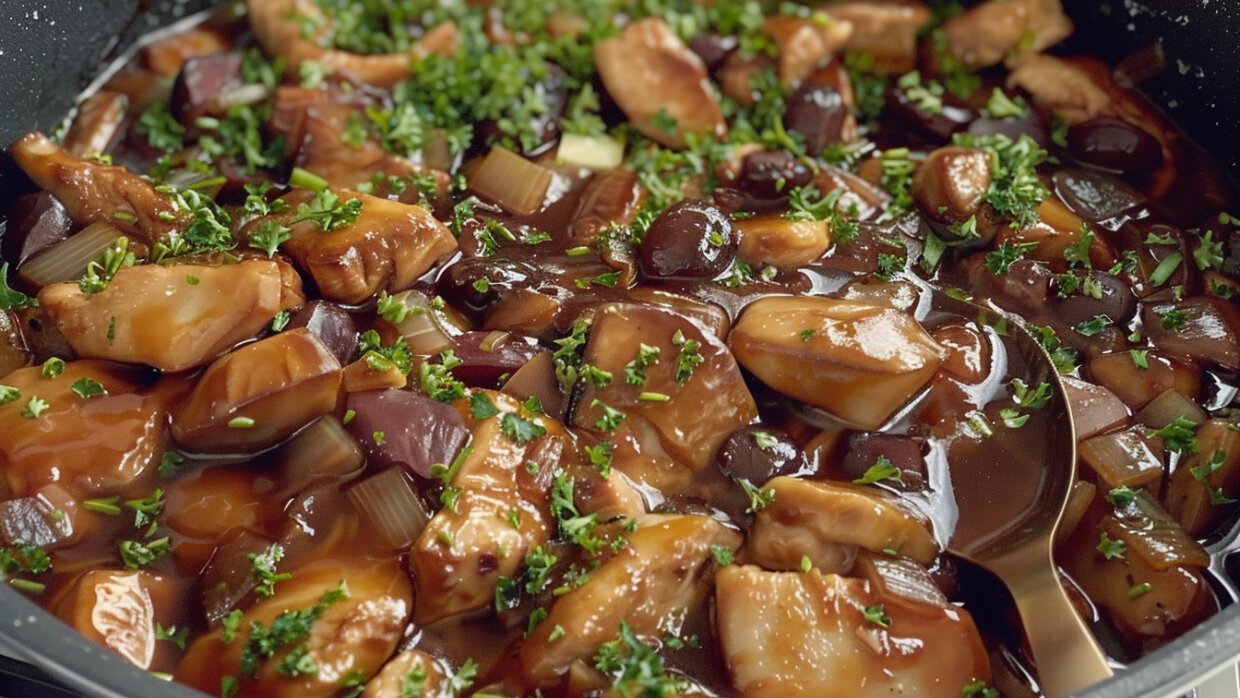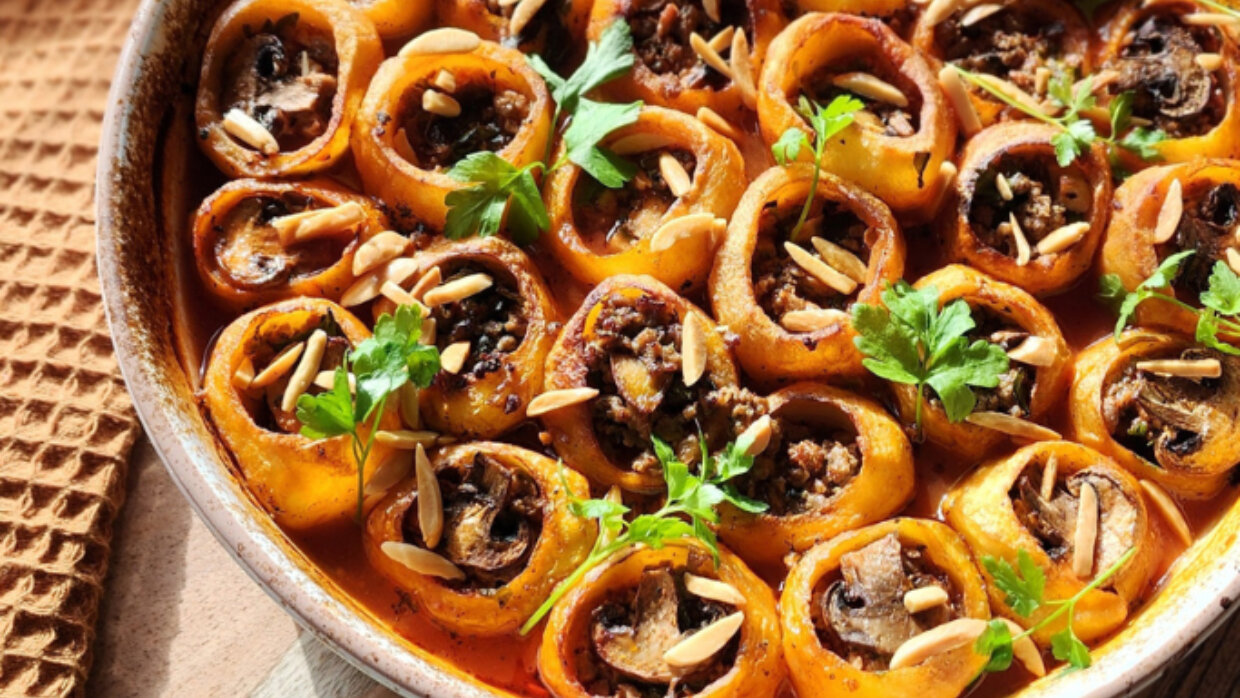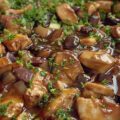Chef Aviv Moshe was one of Israel’s best-known chefs with seven non-kosher restaurants around Israel. It sometimes took weeks to get a reservation.
But last year Moshe decided that he would no longer work in non-kosher restaurants and convinced one of Israel’s best known establishments just off Allenby street in Tel Aviv to turn kosher.
Called Poupee, it has a gritty-chic exterior and strings of lights hanging inside. The diners are typical Tel Aviv, with many of the women wearing short skirts and very high heels. They feast on kosher dishes like foie gras in a crepe suzette sauce, a cigar stuffed with innards, and mangold (Swiss chard) tortellini along with hand-crafted cocktails.
 Source: Poupee
Source: Poupee
“I am more connected to the world of kashrut now,” Moshe said in an interview. “People would stop me on the street and ask me when I was going to open a kosher restaurant and I was happy to do so when I had the opportunity. I want everyone to be able to “touch” my food.”
 Source: Maree Sky Lounge
Source: Maree Sky Lounge
Today he is in charge of two upscale restaurants – La Poupee in Tel Aviv and the dairy Maree in Netanya, as well as a deli/take-out shop in Tel Aviv. He says that while there are some ingredients that he can’t find with kosher certification, and he can’t make dishes that would have both dairy and meat, opening a kosher restaurant which closes on Shabbat has given him a precious gift – time off from the restaurant to be with his family.
“It opens a whole new world for my family,” the father of two children, ages 12 and 5 said. “Now Shabbat is for my wife and children. It helps to make a distinction between the regular week which is very intense and Shabbat.”
In Jerusalem, the majority of restaurants were always kosher. But in Tel Aviv, until a few years ago, the only kosher restaurants were either in hotels or fast-food shawarma joints. Now almost half of the restaurants in Tel Aviv are kosher, according to a recent survey by the Israel Democracy Institute. In Jerusalem, the number is over 90 percent.
The increase in upscale kosher food comes as kosher food is having a moment around the world. Fueled by more sophisticated kosher diners who have traveled around the world and are willing to pay for a good meal, the cuisine has taken off. It also comes as Israeli food in general, not necessarily kosher, has taken off around the world from Berlin to Barcelona, which even has a kosher restaurant with a Michelin star.
Another celebrity chef who later in his career opened a series of kosher restaurants is Meir Adoni. He had two upscale restaurants in Tel Aviv in the Carlton Hotel, a meat restaurant called Lumina and a dairy one called Blue Sky, both he decided to close during the pandemic. He also opened a series of street-food restaurants around the country called Dunya, all of them were kosher. Now, he is opening an upscale kosher fish restaurants Singapore.
Some other chefs also run both kosher and non-kosher restaurants such as celebrity chef Moshe Segev. He said he opened a kosher restaurant first in Beersheva, which later closed, and then in Netanya so that his family, who keep kosher, could taste his food.
Motti Ohana worked as a chef in several upscale kosher restaurants in Jerusalem before opening up a kosher butcher shop in Jerusalem called Basar Ba’Ir. He said that more celebrity chefs have entered the kosher field which has changed its image.
“People understand that kosher does not have to be a disability,” he told Jewlish.com in an interview. “Suddenly kosher restaurants are not only for religious people. Anyone can go into a kosher restaurant and have an abundance of vegetables and meats. There are a lot of creative chefs who know how to make wonderful things with these products.”
He says that the growing popularity of the Mediterranean diet around the world works well for a kosher restaurant as olive oil, fish and vegetables are easily found kosher. To comply with kashrut, of course, a restaurant must serve either meat or dairy. It means that desserts in a meat restaurant will be pareve, made with oil or margarine instead of butter.
But that is a small price to pay for increasing your clientele. Ohana said more restaurants are opening in hotels and must be kosher. In addition, most restaurants that cater events must be kosher because in most groups of Israelis, there are one or two who keep kosher.
Even many Sephardim, who would not define themselves as Orthodox Jews, and do not strictly keep Shabbat do keep kosher. There is of course a financial price to pay. Non-kosher restaurants do a significant chunk of their business on Friday night and Saturday when Israelis do not work. At the same time, the family time seems to be worth it.
Adeena Sussman, author of the famous Sababa cookbook, has lived in Tel Aviv near Shuk Hacarmel for many years. She says that she has seen more and more restaurants in Tel Aviv turn kosher, partly because of the wave of French immigrants to Tel Aviv and Netanya who keep kosher.
“A lot of the people opening the restaurants aren’t even kosher themselves but they bring their talents to the kosher marketplace,” she said. She said it is not that the chefs are necessarily religious themselves, but opening a restaurant is first and foremost a business decision.
She says that social media also plays an important role as food photos are quickly shared on Instagram. ‘“Tel Aviv used to be a wasteland for kosher diners,” she said in an interview. “But kosher diners want to experience everything that Israeli food has to offer.” And now they can!
Image Source: Poupee
















